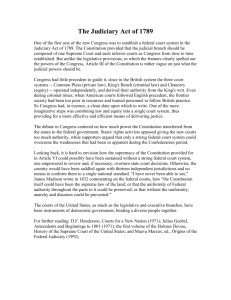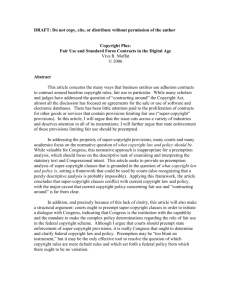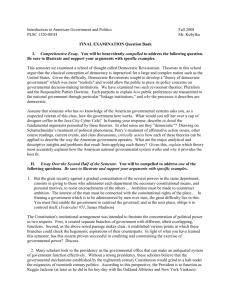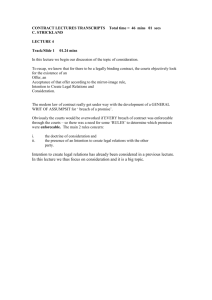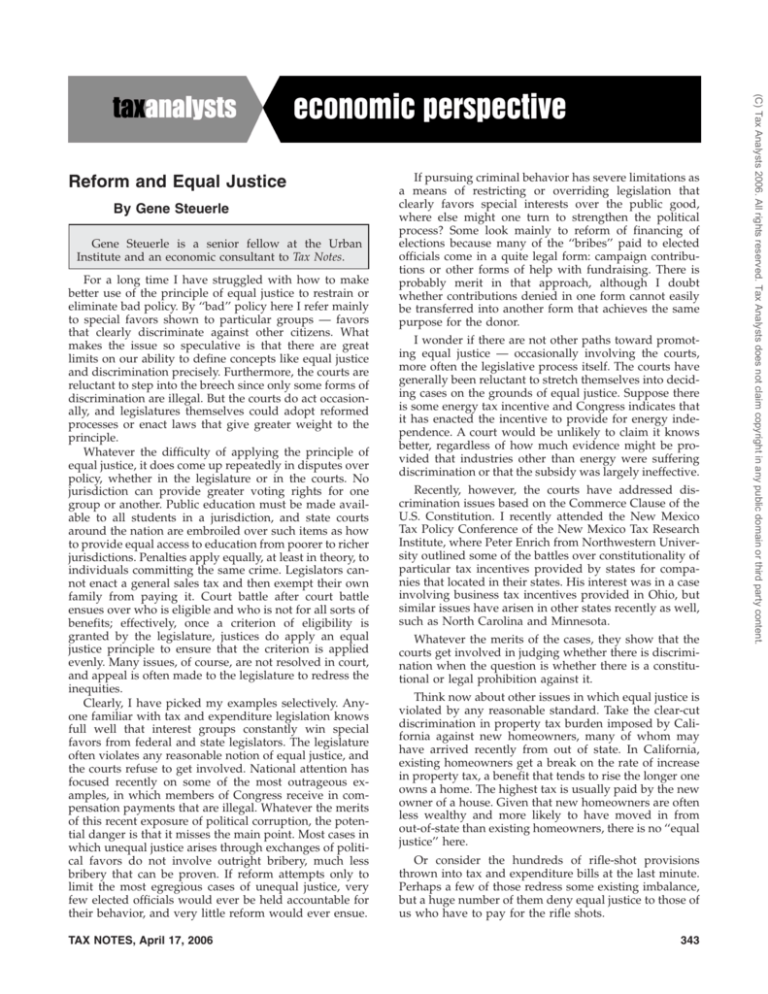
By Gene Steuerle
Gene Steuerle is a senior fellow at the Urban
Institute and an economic consultant to Tax Notes.
For a long time I have struggled with how to make
better use of the principle of equal justice to restrain or
eliminate bad policy. By ‘‘bad’’ policy here I refer mainly
to special favors shown to particular groups — favors
that clearly discriminate against other citizens. What
makes the issue so speculative is that there are great
limits on our ability to define concepts like equal justice
and discrimination precisely. Furthermore, the courts are
reluctant to step into the breech since only some forms of
discrimination are illegal. But the courts do act occasionally, and legislatures themselves could adopt reformed
processes or enact laws that give greater weight to the
principle.
Whatever the difficulty of applying the principle of
equal justice, it does come up repeatedly in disputes over
policy, whether in the legislature or in the courts. No
jurisdiction can provide greater voting rights for one
group or another. Public education must be made available to all students in a jurisdiction, and state courts
around the nation are embroiled over such items as how
to provide equal access to education from poorer to richer
jurisdictions. Penalties apply equally, at least in theory, to
individuals committing the same crime. Legislators cannot enact a general sales tax and then exempt their own
family from paying it. Court battle after court battle
ensues over who is eligible and who is not for all sorts of
benefits; effectively, once a criterion of eligibility is
granted by the legislature, justices do apply an equal
justice principle to ensure that the criterion is applied
evenly. Many issues, of course, are not resolved in court,
and appeal is often made to the legislature to redress the
inequities.
Clearly, I have picked my examples selectively. Anyone familiar with tax and expenditure legislation knows
full well that interest groups constantly win special
favors from federal and state legislators. The legislature
often violates any reasonable notion of equal justice, and
the courts refuse to get involved. National attention has
focused recently on some of the most outrageous examples, in which members of Congress receive in compensation payments that are illegal. Whatever the merits
of this recent exposure of political corruption, the potential danger is that it misses the main point. Most cases in
which unequal justice arises through exchanges of political favors do not involve outright bribery, much less
bribery that can be proven. If reform attempts only to
limit the most egregious cases of unequal justice, very
few elected officials would ever be held accountable for
their behavior, and very little reform would ever ensue.
TAX NOTES, April 17, 2006
If pursuing criminal behavior has severe limitations as
a means of restricting or overriding legislation that
clearly favors special interests over the public good,
where else might one turn to strengthen the political
process? Some look mainly to reform of financing of
elections because many of the ‘‘bribes’’ paid to elected
officials come in a quite legal form: campaign contributions or other forms of help with fundraising. There is
probably merit in that approach, although I doubt
whether contributions denied in one form cannot easily
be transferred into another form that achieves the same
purpose for the donor.
I wonder if there are not other paths toward promoting equal justice — occasionally involving the courts,
more often the legislative process itself. The courts have
generally been reluctant to stretch themselves into deciding cases on the grounds of equal justice. Suppose there
is some energy tax incentive and Congress indicates that
it has enacted the incentive to provide for energy independence. A court would be unlikely to claim it knows
better, regardless of how much evidence might be provided that industries other than energy were suffering
discrimination or that the subsidy was largely ineffective.
Recently, however, the courts have addressed discrimination issues based on the Commerce Clause of the
U.S. Constitution. I recently attended the New Mexico
Tax Policy Conference of the New Mexico Tax Research
Institute, where Peter Enrich from Northwestern University outlined some of the battles over constitutionality of
particular tax incentives provided by states for companies that located in their states. His interest was in a case
involving business tax incentives provided in Ohio, but
similar issues have arisen in other states recently as well,
such as North Carolina and Minnesota.
Whatever the merits of the cases, they show that the
courts get involved in judging whether there is discrimination when the question is whether there is a constitutional or legal prohibition against it.
Think now about other issues in which equal justice is
violated by any reasonable standard. Take the clear-cut
discrimination in property tax burden imposed by California against new homeowners, many of whom may
have arrived recently from out of state. In California,
existing homeowners get a break on the rate of increase
in property tax, a benefit that tends to rise the longer one
owns a home. The highest tax is usually paid by the new
owner of a house. Given that new homeowners are often
less wealthy and more likely to have moved in from
out-of-state than existing homeowners, there is no ‘‘equal
justice’’ here.
Or consider the hundreds of rifle-shot provisions
thrown into tax and expenditure bills at the last minute.
Perhaps a few of those redress some existing imbalance,
but a huge number of them deny equal justice to those of
us who have to pay for the rifle shots.
343
(C) Tax Analysts 2006. All rights reserved. Tax Analysts does not claim copyright in any public domain or third party content.
Reform and Equal Justice
COMMENTARY / ECONOMIC PERSPECTIVE
344
pretation. No set of rules works without some willingness to make it work. But Congress is in big trouble now.
The budget is totally out of whack. The situation is much
worse than the fiscally constrained period from 1982 to
1997 when most budget legislation involved deficitcutting of some type or another. There is now considerable impetus for Congress to find rules that would
constrain actions by members that further exacerbate the
budget situation.
Why not also establish a permanent Equal Justice
Commission? That might be done by legislation, by
Executive Order, or by the private effort of some foundations from left, right, and center. Its job would be to
point out relatively flagrant violations of equal justice at
both federal and state levels, the beneficiaries involved,
and the members of Congress who took the lead in
serving those beneficiaries. Would it be controversial? Of
course. Would it always be right? No. But if set up in a
truly bipartisan way, it might just serve to reduce the
extent to which legislation has become more and more
hostage to interests who, whatever the merit of their
arguments, seldom start out with the public good as their
primary objective.
Dear Reader: Help me here. Perhaps the options
presented here would not work. Yet I can’t believe there
aren’t some better ways to engage courts, legislatures,
and executive branch agencies in addressing violations of
equal justice. Suggestions are welcome.
TAX NOTES, April 17, 2006
(C) Tax Analysts 2006. All rights reserved. Tax Analysts does not claim copyright in any public domain or third party content.
If the courts can’t deal with those issues right now,
what type of rule or law would put those types of
provisions into some legislative or court procedure, subject to consideration as violations of justice?
From about 1990 to 1997, Congress adopted and
operated under a set of budget procedures that restricted
bills from increasing the deficit in various ways. In 2001
it limited how permanent tax cuts could be under the
so-called Byrd rule in the Senate. What is to prevent
Congress from adopting other rules that constrain its
actions when justice is at stake? Why not allow one
senator to call a point of order on any bill that does not
firmly identify what special interests are targeted to
receive benefits under any part of a bill? Or why can’t a
chair of the taxwriting committee require as his own rule
that any member favoring any provision aimed at one set
of taxpayers must indicate an approximation of the size
of the benefit to the favored population and the average
tax increase borne by the rest of the population to pay for
it? Why can’t the IRS automatically indicate the administrative requirements imposed on it by any special
interest legislation — hopefully before a bill passes, but,
if there isn’t time, then afterwards? Why can’t the president, with or without a line-item veto, direct the Office of
Management and Budget to provide a list of the beneficiaries of special interest legislation?
Yes, I know, Congress can override its own procedural
requirements, as it did many times in recent years.
Defining what is special interest is also subject to inter-


